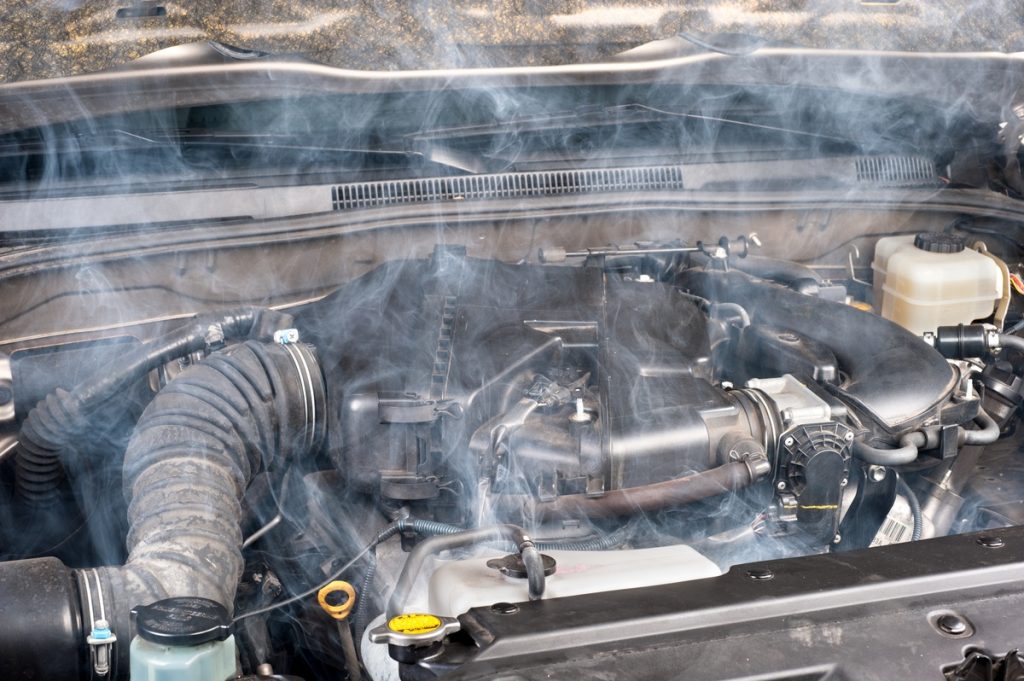Most newer cars have built-in systems that stop them from overheating, but it occasionally does happen. In this blog we look at how to know if your car has overheated, what to do about it, and how to prevent it.
Signs that your car has overheated
If your car is overheating, the temperature gauge on your dashboard will rise. Depending on the vehicle model you own, you may even have a malfunction light or indicator that warns you that your car is overheating.
Other signs that your car has overheated include vapour, steam or smoke coming from the bonnet, or a smell coming from the engine.
Why is my car overheating?
People often assume that the outside temperature is the cause of a car overheating. While cars do tend to overheat more in the summer, there are a few main reasons why a car may overheat.
Cooling system
There may be an issue with the cooling system or a cooling system leak. Your car may have low levels of water or coolant that are required to keep the engine temperature down. Or there may be another problem with the cooling system that is preventing heat from escaping from the engine compartment.
Faulty radiator
A problem with the radiator or low levels of radiator fluid may be the cause of your car overheating. The radiator is what keeps the engine cool, so if it’s not functioning properly it may lead to overheating of your car.
Broken water pump
If your car’s water pump isn’t circulating coolant through the engine compartment, the engine will overheat. The water pump may also be corroded with rust or other damage, preventing it from doing its job.
What to do if your car keeps overheating
If your car overheats on a regular basis, you’ll need to book in for a service to have the problem properly diagnosed. As we’ve seen above, there are a few reasons why this may be happening.
Get in touch with the experienced team at Mt Roskill Collision Centre and we can diagnose and repair the problem for you.
If you’re out driving and your car starts to overheat, take the following steps to immediately deal with the overheating.
Turn off the AC
Your first instinct may be to try to cool things down by turning on the air conditioning. You want to do the opposite. Turn off the AC and turn on the heat.
This draws heat away from the engine to keep it from overheating.
It lessens the burden on the cooling system, which is where the problem may be stemming from. You may need to tolerate an uncomfortably hot car temporarily, but you should see the temperature gauge start to go down.
If you are driving, find a safe space to park
Find a safe place to pull over and stop the car. You’ll want to turn off the engine to allow it to cool. This may take at least 15 minutes.
While you’re waiting safely in your vehicle on the side of the road, take the time to put a plan in place. Your plans might be slightly delayed, and you may need to call a technician.
To make things easier for you, we suggest having the Mt Roskill Collision Centre phone number saved in your address book. By the way, it’s 0800227762.
Check coolant levels and restart your car
After waiting approximately 15 minutes, you can check the coolant levels if you’re confident doing so.
Put on gloves (it’s a good idea to keep a pair in your car first aid kit), or find a rag and open the bonnet. If there’s still steam coming from the bonnet, stay away. Steam burns can be serious.
If it’s safe to open the bonnet, locate the radiator cap, cover it with a rag or glove, and loosen it a quarter turn. Pressure will be released. Then open it fully and slowly add more coolant if you have some. Replace the cap and turn on the car engine again.
If the temperature gauge stays in the normal range, safely drive your car to the technician or service station to have it checked out. If the car overheats again, contact your technician or roadside assistance. It’s not safe to continue to drive a car that is overheating.
If your car keeps overheating, see a technician
Sometimes a car overheats simply because of low coolant levels. Refill these and monitor the situation. But if your car keeps overheating, it’s time to take it to the technician to have it adequately assessed.
Contact the team at Mt Roskill Collision Centre for a car service and we can diagnose the issue accurately for you.
If you want, we can even show you how to check and top-up your coolant levels yourself in future.
Call us on 0800 227 762 or email [email protected] for professional and friendly car servicing advice.
